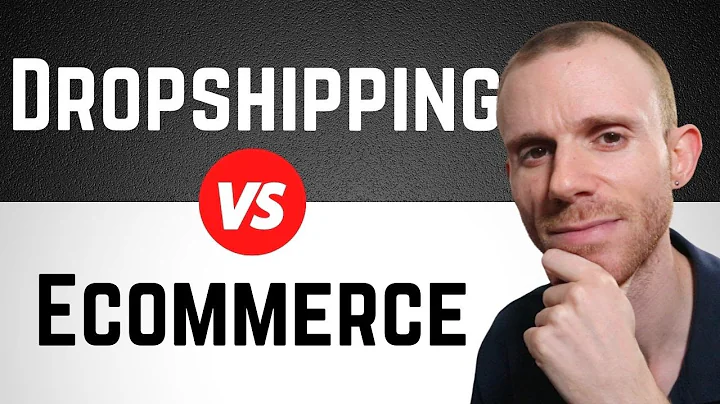Start Your Profitable Baby Store Online
Table of Contents:
- Introduction
- Choosing the Business Method
- Supplier Research Process
- Registering Your Business
- Opening a Business Bank Account
- Branding Your Baby Shop
- Buying Web Hosting
- Building Your Website
- Setting Up a Merchant Account
- Making Money with Your Baby Store
- Startup Costs and Financing Options
- Conclusion
How to Start a Baby Store Online
Starting a baby store online can be a lucrative venture, considering the booming baby industry that generates billions of dollars each year. Whether you're a first-time business owner or just looking to start your own baby store, this guide will provide you with a quick start and everything you need to know to get started.
1. Introduction
The baby industry is a growing market, and with so many people having babies, starting a baby store online can be a profitable business opportunity. However, before diving into the process, it's important to understand the different methods of running an online baby store.
2. Choosing the Business Method
When starting an online baby store, you have two main options: setting up a drop ship store or buying and shipping your own inventory. Both methods have their pros and cons, so it's essential to determine which one aligns better with your business goals and resources.
3. Supplier Research Process
Regardless of the method you choose, conducting thorough supplier research is crucial. If you opt for drop shipping, start by searching for "dropship baby products" to find suppliers who can provide a wide range of products for your online store. On the other hand, if you decide to buy and ship your own inventory, search for "wholesale baby items" to find reliable suppliers to purchase from in bulk.
4. Registering Your Business
Before you can start sourcing products, it's important to officially register your business. This involves obtaining a federal EIN number, forming an LLC or corporation, and potentially acquiring a reseller or retail merchant certificate, depending on your state's requirements. Registering your business will enable you to buy wholesale baby items and work with drop ship suppliers.
5. Opening a Business Bank Account
To keep your personal and business finances separate, it's essential to open a business bank account for your baby store. Make sure you have your legal incorporation paperwork and EIN number ready when approaching a local bank or choosing a new one. This step will ensure smooth financial transactions and facilitate tax management.
6. Branding Your Baby Shop
Branding plays a significant role in creating your store's identity and attracting customers. Invest in professional logo design and marketing materials to leave a lasting impression. Platforms like 99designs and Envato offer affordable branding solutions that cater to various business needs.
7. Buying Web Hosting
To establish your online presence, you'll need reliable web hosting. Bluehost is a highly recommended option for e-commerce websites, offering attractive packages, free domain registration, SSL certificates, advertising credits, and 24/7 tech support. Choose a hosting plan that suits your requirements and complements your business goals.
8. Building Your Website
Once you have secured web hosting, it's time to build your website. Platforms like Fiverr connect you with affordable web developers who can set up your site quickly. Provide your Bluehost login credentials, communicate your vision and requirements to the developer, and ensure a smooth integration process.
9. Setting Up a Merchant Account
To accept payments from your customers, you'll need to set up a merchant account. Popular options include PayPal, Square, and Stripe. Square offers user-friendly payment solutions for online, email, and phone transactions. Provide the necessary details to your web developer for seamless integration of the merchant account into your website.
10. Making Money with Your Baby Store
Now that your online baby store is up and running, it's time to start making money. Consider selling popular items such as car seats, diapers, cleaning products, care products, pacifiers, bottles, blankets, and teething rings. Explore additional revenue streams like baby subscription boxes, baby stroller cleaning services, baby car seat repair services, and custom baby gear.
11. Startup Costs and Financing Options
The startup costs for an online baby store using the drop ship method are relatively low, typically ranging from $500 to $1500. However, if you choose to manage your own inventory, be prepared for higher expenses, including warehousing and potential employee hiring. Explore financing options if needed, and consider the scalability of your business.
12. Conclusion
Starting a baby store online can be a fulfilling and profitable venture. By following the steps outlined in this guide, you have everything you need to get started. Remember, taking the leap and chasing your dreams can lead to great success. Should you ever need assistance or guidance along the way, reach out for support.
Highlights:
- The baby industry is bringing in $85 billion annually, presenting a significant opportunity for entrepreneurs looking to start a baby store online.
- Two main methods of running an online baby store: drop ship or buying and shipping your own inventory.
- Thorough supplier research is critical for both methods, ensuring access to a wide range of baby products.
- Registering your business and opening a separate bank account are essential steps to ensure legal compliance and easy financial management.
- Branding plays a significant role in creating a strong identity for your baby store.
- Bluehost is a reliable web hosting provider for e-commerce websites.
- Fiverr offers affordable web development services to help you build your website quickly.
- Setting up a merchant account, such as Square, allows you to accept payments from customers easily.
- Explore profitable product options like car seats, diapers, cleaning products, pacifiers, and more.
- Consider additional revenue streams including baby subscription boxes and specialized services.
- Startup costs depend on the chosen method, with drop ship stores typically requiring lower initial investment.
- Remember to seek support and guidance throughout the process, and don't hesitate to reach out for assistance.
FAQ:
Q: What are the startup costs for an online baby store?
A: The startup costs can vary depending on the chosen method. Drop ship stores typically require lower initial investments, ranging from $500 to $1500 on average. If you decide to manage your own inventory, be prepared for higher expenses, including warehousing and potential employee hiring.
Q: How can I find reliable suppliers for my baby store?
A: Conducting thorough supplier research is crucial for the success of your baby store. Use search terms like "dropship baby products" or "wholesale baby items" to find suppliers that align with your business goals. Evaluate their reliability, product range, and customer reviews before making any commitments.
Q: Is branding important for an online baby store?
A: Yes, branding is crucial for creating a strong identity and leaving a lasting impression on your customers. Invest in professional logo design, website design, and marketing materials to establish a cohesive and appealing brand image. Platforms like 99designs and Envato offer affordable branding solutions tailored to various business needs.
Q: What additional services can I offer in my baby store to generate more revenue?
A: There are several additional services you can consider offering to generate more revenue. These include baby subscription boxes, baby stroller cleaning services, baby car seat repair services, and custom baby gear. Assess the demand and market potential for these services in your target customer base.
Q: How can I finance my online baby store startup?
A: If you require financing for your online baby store startup, explore various options such as loans, grants, or investors. You may also consider bootstrapping or self-funding if your initial investment requirements are relatively low. Evaluate the scalability of your business model and create a comprehensive business plan to attract potential investors or secure financing.















